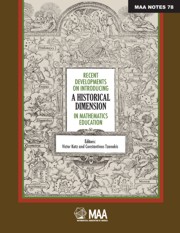Book contents
- Frontmatter
- Preface
- Contents
- 1 Teaching with Primary Historical Sources: Should it Go Mainstream? Can it?
- 2 Dialogismin Mathematical Writing: Historical, Philosophical and Pedagogical Issues
- 3 The Process of Mathematical Agreement: Examples from Mathematics History and an Experimental Sequence of Activities
- 4 Researching the History of Algebraic Ideas from an Educational Point of View
- 5 Equations and Imaginary Numbers: A Contribution from Renaissance Algebra
- 6 The Multiplicity of Viewpoints in Elementary Function Theory: Historical and Didactical Perspectives
- 7 From History to Research in Mathematics Education: Socio-Epistemological Elements for Trigonometric Functions
- 8 Harmonies in Nature: A Dialogue Between Mathematics and Physics
- 9 Exposure to Mathematics in the Making: Interweaving Math News Snapshots in the Teaching of High-School Mathematics
- 10 History, Figures and Narratives in Mathematics Teaching
- 11 Pedagogy, History, and Mathematics: Measure as a Theme
- 12 Students' Beliefs About the Evolution and Development of Mathematics
- 13 Changes in Student Understanding of Function Resulting from Studying Its History
- 14 Integrating the History of Mathematics into Activities Introducing Undergraduates to Concepts of Calculus
- 15 History in a Competence Based Mathematics Education: A Means for the Learning of Differential Equations
- 16 History of Statistics and Students' Difficulties in Comprehending Variance
- 17 Designing Student Projects for Teaching and Learning Discrete Mathematics and Computer Science via Primary Historical Sources
- 18 History of Mathematics for Primary School Teacher Education Or: Can You Do Something Even if You Can't Do Much?
- 19 Reflections and Revision: Evolving Conceptions of a Using History Course
- 20 Mapping Our Heritage to the Curriculum: Historical and Pedagogical Strategies for the Professional Development of Teachers
- 21 Teachers' Conceptions of History of Mathematics
- 22 The Evolution of a Community of Mathematical Researchers in North America: 1636–1950
- 23 The Transmission and Acquisition of Mathematics in Latin America, from Independence to the First Half of the Twentieth Century
- 24 In Search of Vanishing Subjects: The Astronomical Origins of Trigonometry
- About the Editors
4 - Researching the History of Algebraic Ideas from an Educational Point of View
- Frontmatter
- Preface
- Contents
- 1 Teaching with Primary Historical Sources: Should it Go Mainstream? Can it?
- 2 Dialogismin Mathematical Writing: Historical, Philosophical and Pedagogical Issues
- 3 The Process of Mathematical Agreement: Examples from Mathematics History and an Experimental Sequence of Activities
- 4 Researching the History of Algebraic Ideas from an Educational Point of View
- 5 Equations and Imaginary Numbers: A Contribution from Renaissance Algebra
- 6 The Multiplicity of Viewpoints in Elementary Function Theory: Historical and Didactical Perspectives
- 7 From History to Research in Mathematics Education: Socio-Epistemological Elements for Trigonometric Functions
- 8 Harmonies in Nature: A Dialogue Between Mathematics and Physics
- 9 Exposure to Mathematics in the Making: Interweaving Math News Snapshots in the Teaching of High-School Mathematics
- 10 History, Figures and Narratives in Mathematics Teaching
- 11 Pedagogy, History, and Mathematics: Measure as a Theme
- 12 Students' Beliefs About the Evolution and Development of Mathematics
- 13 Changes in Student Understanding of Function Resulting from Studying Its History
- 14 Integrating the History of Mathematics into Activities Introducing Undergraduates to Concepts of Calculus
- 15 History in a Competence Based Mathematics Education: A Means for the Learning of Differential Equations
- 16 History of Statistics and Students' Difficulties in Comprehending Variance
- 17 Designing Student Projects for Teaching and Learning Discrete Mathematics and Computer Science via Primary Historical Sources
- 18 History of Mathematics for Primary School Teacher Education Or: Can You Do Something Even if You Can't Do Much?
- 19 Reflections and Revision: Evolving Conceptions of a Using History Course
- 20 Mapping Our Heritage to the Curriculum: Historical and Pedagogical Strategies for the Professional Development of Teachers
- 21 Teachers' Conceptions of History of Mathematics
- 22 The Evolution of a Community of Mathematical Researchers in North America: 1636–1950
- 23 The Transmission and Acquisition of Mathematics in Latin America, from Independence to the First Half of the Twentieth Century
- 24 In Search of Vanishing Subjects: The Astronomical Origins of Trigonometry
- About the Editors
Summary
Introduction
Since the early 1980s, my colleagues and I have been studying the history of algebraic ideas as a component of our research on the teaching and learning of school algebra. In Filloy, Rojano and Puig [6, ch. 1, ch. 3 and ch. 10], we discuss in some detail in which sense our study of the history of algebraic ideas is made from the point of view of mathematics education. What do we mean by studying the history of mathematics from the point of view of mathematics education? First, we mean that the problems of the teaching and learning of algebra is what determines for us which texts must be sought out in history and what questions we should address to them.
Indeed, in our research on the teaching and learning of algebra we have observed that, when dealing with arithmetic-algebraic word problems or with the solution of equations, pupils use a stratified sign system, with strata that come from their previously acquired vernacular and arithmetic language, and also from the concrete models used in the teaching sequences. As a consequence, we conceive the construction by pupils of the language of symbolic algebra as the final identification, within a single language stratum, of those earlier language strata that are irreducible from one stratum to another until the more abstract language has been developed [6, p. 263, and chapter 6].
Information
- Type
- Chapter
- Information
- Publisher: Mathematical Association of AmericaPrint publication year: 2011
Accessibility standard: Unknown
Why this information is here
This section outlines the accessibility features of this content - including support for screen readers, full keyboard navigation and high-contrast display options. This may not be relevant for you.Accessibility Information
- 1
- Cited by
